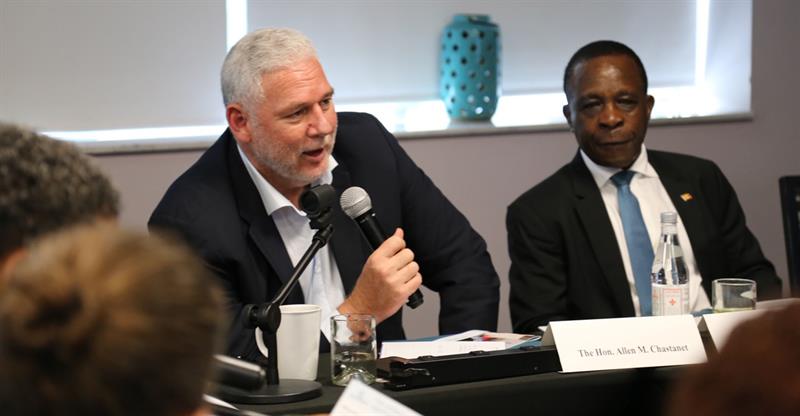BLACKLISTING IS UNDEMOCRATIC AND HAS A CATASTROPHIC EFFECT, HE SAYS.
 Prime Minister of Saint Lucia and immediate past Chairman of CARICOM, Hon. Allen Chastanet, spoke at the 31st Inter-Sessional Meeting of the Conference of Heads of Government of the CARICOM.
Prime Minister of Saint Lucia and immediate past Chairman of CARICOM, Hon. Allen Chastanet, spoke at the 31st Inter-Sessional Meeting of the Conference of Heads of Government of the CARICOM.
He highlighted a number of challenges confronting member states including climate change, blacklisting by the European Union, adversities facing small island states in the international community, the ongoing situation in Venezuela, and de-risking in the region. De-risking refers to the restriction of correspondent banking relationships or business services from major global banks to certain jurisdictions, due to concerns over money laundering or potential involvement in the financing of terrorist activities.
Prime Minister Hon. Chastanet highlighted how crucial it was that CARICOM continues to lobby to have these issues addressed.
“In November last, as a direct result of our Saint Lucia meeting, a delegation from the CARICOM led by the distinguished Prime Minister of Antigua and Barbuda took the issue of correspondent banking and de-risking to Washington in light of the threat of our financial institutions losing critical relationships with US banks. I can report that we have moved the needle on de-risking and that the OECS is working on a single compliance department. We were able to draw the attention of the members of the Financial Services Committee of the United States’ Congress and senior representatives of major US banks, including Bank of America, to the catastrophic effect which the stringent measures being imposed on domestic banks by correspondent banks in the United States and the negative impact which the withdrawal of such services was having on economies in CARICOM Member States.”
The Prime Minister disclosed that up to the mid-2018, 25 percent of the 50 banks operating with CARICOM countries had reported termination of correspondent banking services, while 75 percent reported that they were facing correspondent banking restrictions. Other negative consequences include an increase in operational costs, an extension in the processing time for international payments and increased difficulty in account opening or securing banking services.
The Prime Minister noted another issue plaguing the region—that of blacklisting. He indicated that a CARICOM delegation interfaced with the European Union on the troubling issue which still exists today.
“Member states of the community, however, continue to take the necessary steps to comply with the demands of the regulating agencies, but while they do, countries in our region are still being penalized. Some of us remain on the grey list, while one member state remains on the blacklist. We must continue working until all of us are off the list, but more importantly, we must make every effort to ensure this undemocratic and discriminatory practice of a public blacklist is discontinued.”
The 31st Inter- Sessional Meeting of the Conference of Heads of Government of CARICOM was held on Feb. 18.